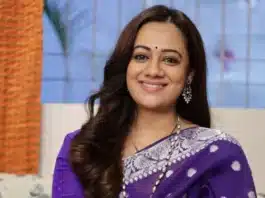

Anurag Basu is an Indian film director, screenwriter, actor, and producer who was born on May 8, 1970. His signature style of directing films typically deals with strong topics like adultery, jealousy, and passion.
Following some early disappointments, he made his breakthrough in 2004 with the erotic thriller Murder. He then rose to prominence in 2006 with the musical romantic thriller Gangster: A Love Story and in 2007 with the ensemble urban drama Life in a… Metro, which won him the Filmfare Award for Best Screenplay and led to his first nomination for Best Director.
Read Also – Actress Soniya Bansal Biography, Wiki
The highly acclaimed romantic comedy-drama Barfi! (2012), which garnered him a second nomination for the Filmfare Award for Best Director, became his best grossing film. Following that, he directed the much-delayed musical adventure comedy-drama Jagga Jasoos (2017), which received mixed reviews and was a commercial failure; he also made his cinematography debut in the Netflix black comedy crime film Ludo (2020). He received his third nomination for the Filmfare Award for Best Director for the latter picture as well.
Anurag Basu Childhood
In Bhilai, Madhya Pradesh, Basu was born into an upper-middle-class Bengali family (now in Chhattisgarh). Basu grew up watching his parents, award-winning theatrical performers Subrato Bose and Deepshikha Bose (ex-executives in SAIL Bhilai Steel Plant in Cokeovens and Education department (Organic Chemistry), respectively, perform in his father’s play group, Abhiyaan. In Bhilai, Chhattisgarh, he attended BSP Senior Secondary School, Sector-IV (SSS-IV) (then Madhya Pradesh). He graduated with honours from the University of Mumbai with a B.Sc. in Physics with plans to study cinematography at FTII, Pune. Nevertheless, while attending college there, he got the chance to work as a technical assistant on several TV and movie productions. After making an effort to stay in the film industry, Basu worked as Raman Kumar’s associate director on Tara.
Anurag Basu Career
On TV
In the middle of 1994, Basu started working on television as an assistant director on Tara. He was granted complete control for directing around 712 episodes after six months. He directed television serials, experimenting with a variety of genres, including horror (X-Zone) and thrillers like Saturday Suspense and Ajeeb Dastaan, as well as daily soap operas. During this time, Basu’s most popular work was the 2000 Balaji Telefilms soap opera Koshish…Ek Aashaa. He also produced pilot episodes for Indian television shows in 2001 and 2002, including Kyun ki saans bhi kabhi bahu thi, Kahani ghar ghar ki, and Kasouti zindagi ki. When he first started his own business, he created TV shows for Sony Channel and Zed TV.
Manzilien Apni Apni, Miit, Thriller at Ten, and Horror Shows on Zed were among his company’s most watched programs. He was the director of all of his other TV shows, including Manzilien Apni Apni and Miit (which was based on Rabindranath Tagore’s novel Noukadubi). Basu is a prolific television director. He was honoured with an Aashirwad Award for Best Director two years after winning a RAPA Award for Best Director from the Radio and TV Advertisers Practitioners Association in 2000.
In 2007, Basu made a comeback to television as producer and director of the collegiate drama Love Story. In 2010, she presented Zed Bangla’s Bengali reality show Ke Hobe Biggest Fan (Who Will Be the Biggest Fan) as presenter. In 2007, Basu founded his own production business, Ishana Movies, and collaborated with co-producer UTV on the musical drama film Life in a… Metro. Rabindranath Tagore’s series Stories is currently available on EPIC Channel and Netflix. Along with Shilpa Shetty and Geeta Kapoor, Basu will serve as a judge in the next television program, “Super Dancer Chapter 4.”
Anurag Basu Movies
First project, directing debut, and commercial success (2003–04)
As an extra in the action drama Dalaal (1993), Basu made his cinematic debut. His first feature film as a director was the horror slasher Kucch To Hai (2003) from Balaji Motion Pictures. This was followed by the supernatural fantasy romance thriller Saaya (2003) from Vishesh Films. When both films were released, critics gave them very bad reviews, and they both ended up being box office failures.
With the seductive thriller Murder (2004), which starred Emraan Hashmi and Mallika Sherawat in the key parts, Basu made his debut. It is the first installment of the Murder film series, and it is based on the American movie Unfaithful (2002). The movie narrated the tale of an unhappy married woman having an illicit romance with her ex. It was rare for Indian cinema at the time, but its sex scenes and sensual subject matter earned it an A rating from the Central Board of Film Certification. Though it opened to mixed reviews from critics, it was a box office hit and ended up being the seventh highest-grossing Hindi film of the year.
Anurag Basu directed Tumsa Nahin Dekha: A Love Story, a musical romance that featured Hashmi and Dia Mirza in the same year. Basu was given an acute leukaemia diagnosis halfway through the movie. He was admitted to the hospital right away, where he directed portions of the movie from a bed. While the filmmaker endured treatment, Mahesh Bhatt and Mohit Suri finished the film, following his dictaphone instructions for camera angles and writing modifications. Critics gave the movie varying to poor reviews when it first came out, and it was a commercial failure at the box office.
Achievement (2006–12)
The musical romantic thriller Gangster: A Love Story (2006), which starred debutante Kangana Ranaut alongside Hashmi and Shiney Ahuja in the key roles, was Basu’s third endeavour as director. The film explores themes of love, treachery, and the criminal underworld through the intricate love triangle involving a pub singer, her enigmatic lover, and a gangster. When it was first released, it garnered favourable reviews from critics who praised the cast performances, soundtrack, storyline, and cinematography. At the box office, the movie became a commercial triumph.
Read Also – Actress Aishwarya Sharma Biography, Wiki
Next, in 2007 he directed and penned the screenplay for the group urban drama Life in a… Metro. Nine Mumbai-based characters tell their stories in the movie, which explores issues including love, commitment anxiety, sacredness of marriage, and extramarital affairs. Upon its premiere, it was widely praised by critics for its innovative premise, narrative, screenplay, dialogue, soundtrack, and ensemble cast performances. At the box office, the movie became an unexpected commercial success. In addition to receiving his first nomination for the Filmfare Award for Best Director, Life in a… Metro earned Basu the Filmfare Award for Best Screenplay.
His following picture was the 2010 romantic action thriller Kites, which starred Kangana Ranaut, deutante Bárbara Mori, and Hrithik Roshan in the lead parts. The film chronicles the turbulent love tale between a dance teacher trapped in a green card marriage and a woman on the run, and it was shot in Hindi, English, and Spanish.
When it was first released, the film drew mixed to unfavourable reviews from critics, who criticised it harshly for being a multilingual story with much of the dialogue in Spanish and English. A below-average grosser at the box office, the movie defied pre-release hype because of its cast.
The romantic comedy-drama Barfi! (2012), which starred Ranbir Kapoor, Priyanka Chopra, and Ileana D’Cruz in the key roles, was Basu’s next endeavour as director and screenwriter. The film is set in the 1970s and centres on a deaf-mute young man, an autistic girl, and a nostalgic young woman in a love triangle. Widespread critical acclaim greeted it upon its premiere, with commendation given to the film’s director, writing, cinematography, soundtrack, cast performances, and representation of individuals with physical disabilities. At the box office, the movie was a huge commercial success, earning ₹175 crore globally, making it the sixth highest-grossing Hindi film of the year. Basu received his second nomination for the Best Director Filmfare Award from Barfi!.
Barfi! was screened at numerous film festivals, including those in Taipei, Busan, and Marrakech. At the Okinawa International Movie Festival in Japan, it was awarded the esteemed Grand Jury Award. The movie was not nominated for an Academy Award for Best International Feature Film at the 85th Academy Awards, despite making the shortlist as India’s official entry. That decision to enter the nation, meanwhile, drew criticism after Basu was charged with stealing scenes from multiple Hollywood productions. Barfi! has become a cult favourite since its debut thanks to its upbeat plot, catchy soundtrack, cast performances, and endearing quality.
Later career (from 2017 onwards)
Anurag Basu returned to directing with the 2017 musical adventure comedy-drama Jagga Jasoos, starring Kapoor and Katrina Kaif, following a five-year break. Schedule problems caused the release to be delayed from its original 2014 release date. Disney Studios partnered with Basu and Kapoor’s recently formed production firm, Picture Shuru Entertainment, to produce the movie. In order to find his father, a teenage detective and a journalist with a history of mishaps team together. When it was first released, the movie had mixed reviews. Its inventive storytelling technique, soundtrack, photography, and cast performances were praised, but its plot, length, and pacing were criticised. In spite of the excitement that preceded its release, the film was a commercial failure at the box office.
His subsequent project was the 2020 black comedy criminal film Ludo on Netflix, where he also made his feature film debut as a cinematographer. The film, which features an ensemble cast, tells the story of four characters—a motivated young woman, a crafty con artist, a disturbed kid, and a moral police officer—through a succession of interrelated episodes. When it was released, it garnered mixed to excellent reviews from critics who praised the cast performances, soundtrack, cinematography, storyline, and directing. Basu received his first nomination for Best Film and his third nomination for Best Director for the Filmfare Award thanks to the movie.
He is currently Metro’s director. Dino, the follow-up to Life in a… Metro, features a brand-new group of actors. Anurag Basu will next be directing Aashiqui 3, a musical follow-up to Mohit Suri’s Aashiqui 2, which stars Kartik Aaryan alongside Tara Sutaria.
Individual LAnurag Basu Life
Ishana (born 2004) and Ahana (born 2007) are Basu’s two daughters. Basu is married to Tani Basu.
About Latturam – latturam.com is a platform to know some facts about nature, history, health, environment and our lifestyle.
Read Also – Madhur Bhandarkar Biography, Wiki



